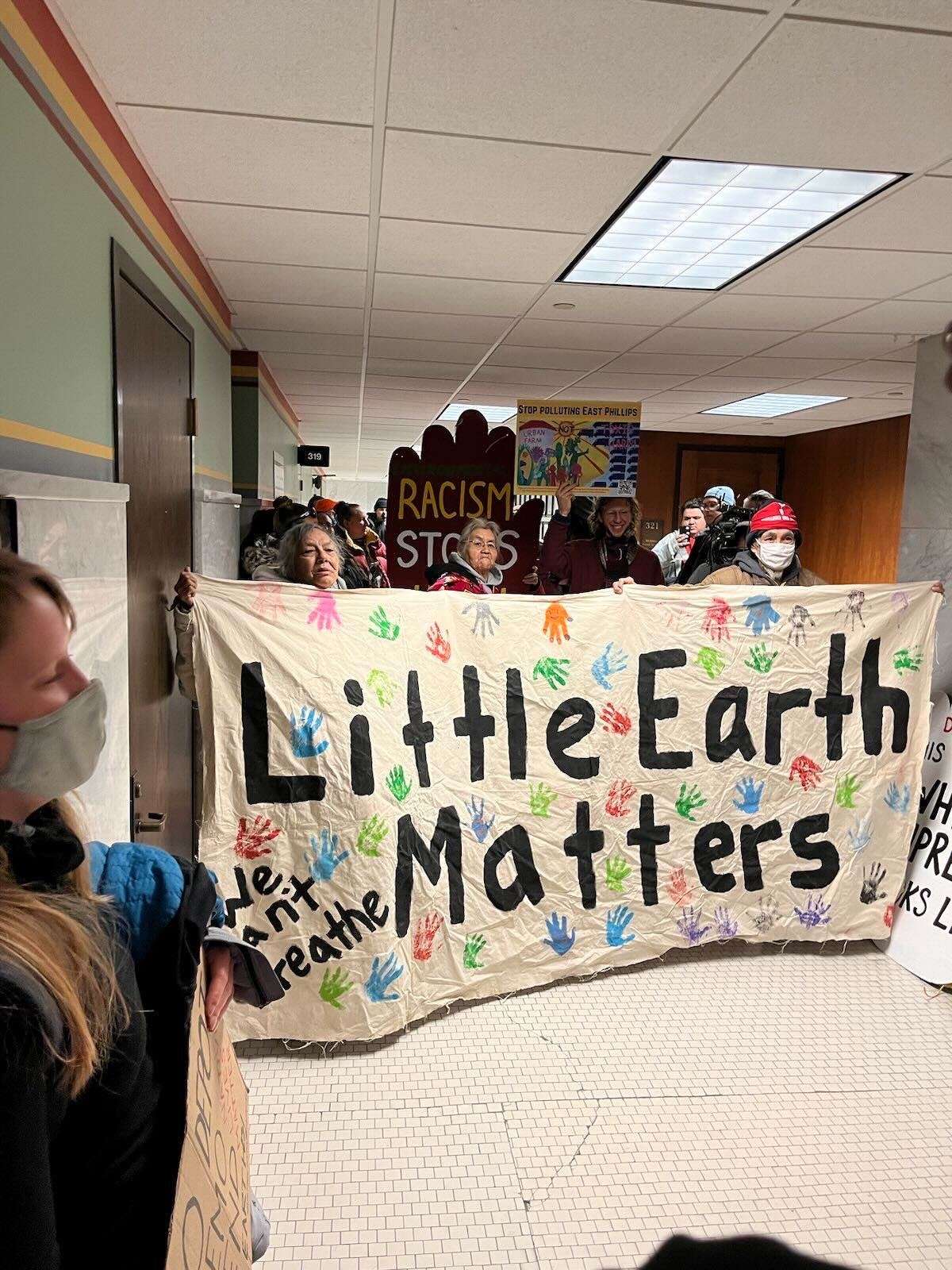The East Phillips Urban Farm fight just had a huge victory! Monday, February 27, was the anticipated first day of demolition of the Roof Depot building. But on Friday, February 24, the judge granted a temporary injunction on demolition for at least two weeks. EPNI needs to raise $10,000 in that time to post bond and request an expedited review on the other case currently in the Minnesota Court of Appeals. The city can also require a higher bond after two weeks should it be able to prove the cost of the injunction.
This day came after two weeks of escalating struggle. On Tuesday, February 14, East Phillips Urban Farm supporters challenged Mayor Jacob Frey publicly at an event announcing Minneapolis’ candidacy to be a UNICEF “child-friendly city.” Frey cut the event short to attend the Missing & Murdered Indigenous Relatives March (MMIWR), where Little Earth resident Nicole Perez—whose four-year-old granddaughter was recently diagnosed with asthma—confronted him and demanded that he stop demolition. Frey fled. The video went viral and was viewed more than 18,000 times.
This energy grew over the course of the week, culminating on the following Tuesday, February 21. At dawn, Indigenous relatives and allies began the occupation of the Roof Depot. The site became Nenoocaasi (“hummingbird” in Ojibwe) Camp. At 1:00 pm, the group gave a press conference. Rachel Thunder, who is Plains Cree and a member of American Indian Movement (AIM), issued the occupation’s demands:
1. Total relocation of the Hiawatha Expansion Project
2. Hand over control of Roof Depot site to the community
3. Plans to remove of Bituminous Roadways and Smith Foundry
4. Enact a moratorium on encampment evictions
5. Provide funding for peer support workers
6. Invest in pilot programs to provide shelter and services to the houseless community like the former navigation center
7. Provide funding for the community’s vision for an indoor urban farm at the Roof Depot site
That evening, the Minneapolis Police Department sent dozens of cops to raid and evict Nenoocaasi Camp from the Roof Depot site. They arrested eight Indigenous people, including Thunder and Perez.




This show of force did not deter the Indigenous leadership opposing demolition. In fact, it strengthened their resolve. The following day, they held another press conference at the nearby Minnesota Indian Women’s Resource Center (MIWRC).
Numerous Indigenous-led organizations were there in support. Marissa Cummings—MIWRC president and CEO, who is Umonhon—opened and closed the press conference. She called the city’s plans for the site “the definition of genocide.”
Tearing up, Cummings emphasized what it meant for all of these groups to be there: “I know that many of our organizations have risked funding cuts, which as you can see we are already vastly underfunded. And we are putting our funding at risk . . . to stand in alliance with this project right now. And that means less resources to people who need it the most. But we’re willing to do that because it’s the right thing to do.”
Compare this solidarity with the cowardice, contempt, and selfish greed displayed by the majority of Minneapolis City Councilmembers the next day. On Thursday, the council voted 6–6 against a simple resolution brought by Councilmember Robin Wonsley recognizing the First Amendment rights of environmental activists. Councilmember Jason Chavez’s attempts to cancel the demolition and the Hiawatha Expansion Project also failed by 6–6 votes. Councilmembers Chavez, Wonsley, Aisha Chughtai, Jeremiah Ellison, Jamal Osman, and Elliott Payne all voted yes. Councilmembers Lisa Goodman, Andrea Jenkins, Emily Koski, Linea Palmisano, Michael Rainville, and LaTrisha Vetaw voted against. Councilmember Andrew Johnson was not present.
Despite the failure of our legislative and executive bodies to respond to the demands of the people, Friday brought the much-needed judicial victory: the temporary injunction. While the occupation of the Roof Depot lasted less than a day, it was part of a successful campaign to force at least one of our formal systems of power to act.
The legal decision reflects the growing support for the East Phillips Urban Farm and opposition to the city’s plan. Jenkins’ new challenger, Soren Stevenson, has opposed demolition. Four South Minneapolis neighborhood organizations have written a letter of support for East Phillips. Hundreds of artists, musicians, and writers have signed their own open letter of support. Local health practitioners and organizations are also working on an open letter.
TCDSA has helped build this growing coalition:
- Our endorsed Councilmembers—Chavez, Chughtai, and Wonsley—have been the strongest fighters for the Urban Farm project.
- Our endorsed State Senator, Omar Fateh, has introduced a bill to allocate $20,000,000 to the East Phillips Neighborhood Institute. (House Representatives Hodan Hassan, Aisha Gomez, and Mohamud Noor have introduced a parallel bill in the House.)
- We led the formation of the TCDSA Health Group, which now has a website focused on mitigating health risks in East Phillips.
- We mobilized callers to demand that Rachel Contracting drop the demolition contract with the city, causing the company to close its phone lines.
- We helped plan and mobilize the MFT Rally for East Phillips on Sunday, February 26.
- Our Street Corp shoveled snow in East Phillips on Friday, February 24.
- We have been on the ground supporting all of the recent Indigenous-led actions.
- The Steering Committee approved a $500 contribution to the $10,000 bond needed for the injunction.
Still, as this past week has made clear, the city is resolute. They have money, bureaucracy, and the police on their side. And the legal system—while it chose the right side in this moment—historically has been a tool for the powerful. However, if enough people stand with East Phillips and Little Earth, we can win. No Demo.
By Connor S

